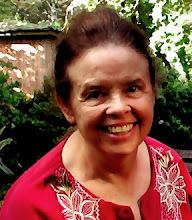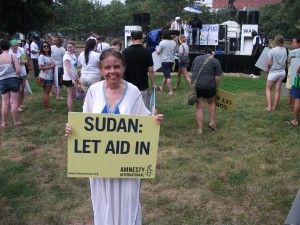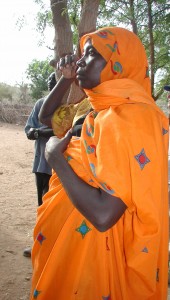

Like many women in their late 60s, I’d enjoyed a varied career and also raised four children and a foster son, mostly as a single parent. In 2000, at 62, I’d gone off to join the Peace Corps in Honduras, and, after returning to the States, for the first time, became a Spanish interpreter and freelance writer, while also looking after my mother in her last years. Then, in 2006, when I was 68, the Bishop Gassis Sudan Relief Fund asked me to go to South Sudan to report on projects it was supporting there. Only a year had passed since a preliminary peace treaty had been concluded between southern Sudanese rebels and the Khartoum government. As a longtime human rights activist, I was anxious to see how this treaty was working out on the ground. But I hesitated to leave my mother’s side, although paid caretakers and my siblings could fill in while I was gone. When I told my 92-year-old mother about the trip, she gave her consent, saying only, “Please be careful.”
My month-long journey began at a thatch-roofed airport at Kenya’s northern border. There, kerosene lamps provided illumination, while a soccer match flickered on a generator-powered television set. Still, this way station was luxurious compared with the bare landing strip in Kauda, Sudan, where the wreckage of a crashed plane remained in mute testimony to a failed landing. I traveled in a Soviet-era cargo plane with Bishop Gassis himself, a Sudanese Catholic prelate, for whom the organization I was representing was named.
 Following local custom, I wore ankle-length skirts despite the suffocating heat. People often crowded around me, eager to see their images on my digital camera. Although I had to strain to decipher Arabic and suppress my urge to speak Spanish, eventually language differences proved fairly unimportant. Women walked eagerly alongside me, holding my hand or fingering my gold earrings. My belongings left unguarded in an open hut were never touched. In a gesture of hospitality, I was often offered strong sweetened tea in a tiny glass and when a goat was slaughtered, chunks of meat were served to guests on spongy pancakes. Evenings, miniature deer and flocks of wild guinea hens foraged for food.
Following local custom, I wore ankle-length skirts despite the suffocating heat. People often crowded around me, eager to see their images on my digital camera. Although I had to strain to decipher Arabic and suppress my urge to speak Spanish, eventually language differences proved fairly unimportant. Women walked eagerly alongside me, holding my hand or fingering my gold earrings. My belongings left unguarded in an open hut were never touched. In a gesture of hospitality, I was often offered strong sweetened tea in a tiny glass and when a goat was slaughtered, chunks of meat were served to guests on spongy pancakes. Evenings, miniature deer and flocks of wild guinea hens foraged for food.
South Sudan offered an even more challenging environment than I had experienced in the Peace Corps: no phones, mail, electricity, or clocks, few roads, and no water in the dry season. Vehicles and fuel had to be airlifted in and there were only a few camels or donkeys available for transportation. I saw the skeleton of a car that had been blown up after hitting a mine. A de-mining organization had designated safe areas with white stones.
Installing deep-water wells was one of the bishop’s projects. As I approached one well, children took turns pumping furiously, filling gourds and jugs while goats and feral-looking pigs drank the overflow. The bishop celebrated Mass outdoors under the trees as worshippers knelt on the bare ground. Women wearing colorful headscarves and long flowered dresses sang while beating drums and shaking homemade rattles. Instead of money offerings, corn, papayas, and pomegranates were deposited into an altar basket, even a live chicken.
 A nun later introduced me to young rape survivors who had escaped from Uganda’s Lord’s Resistance Army, arriving pregnant or infected with HIV. Muslims and Christians alike subjected young girls to a severe form of clitorectomy associated with a doubling of maternal and infant mortality, yet stopping this barbaric practice was not considered a priority given South Sudan’s many other needs. Several teenage boys told me they had returned on foot all the way from exile in Uganda. A woman whose teenage son had disappeared feared that he might have been kidnapped into slavery, a practice not yet eliminated in the area.
A nun later introduced me to young rape survivors who had escaped from Uganda’s Lord’s Resistance Army, arriving pregnant or infected with HIV. Muslims and Christians alike subjected young girls to a severe form of clitorectomy associated with a doubling of maternal and infant mortality, yet stopping this barbaric practice was not considered a priority given South Sudan’s many other needs. Several teenage boys told me they had returned on foot all the way from exile in Uganda. A woman whose teenage son had disappeared feared that he might have been kidnapped into slavery, a practice not yet eliminated in the area.
Muslim pupils as well as Christians attended the bishop’s schools. During the civil war, schools had been targeted by northern bombers trying to wipe out “rebel spawn.” I saw one school destroyed by shelling; another that had been bombed, killing 18 children.
Lured by the availability of water and promise of peace, semi-nomadic herders were moving back to South Sudan, often settling in the hills for safety. There they constructed huts and livestock fences from dry bramble bushes and were preparing the terraced hillsides for planting in the rainy season.
A referendum won by an overwhelming vote led the oil-rich south to form the new country of South Sudan in 2011. In July 2012, I participated in a rally in front of the White House, celebrating that nation’s first anniversary, also protesting the north’s renewed bombardments in border areas and blocking of humanitarian aid. South Sudan has made great progress, but still has a long way to go. Meanwhile, I would urge readers, especially those who are retired or who have flexible schedules, to put aside their fears and take advantage of any unexpected opportunities. We only go through this life once.
==================================================================
Barbara E. Joe, a freelance writer and Spanish interpreter and translator, lives in Washington, DC, and is the author of Triumph & Hope: Golden Years with the Peace Corps in Honduras, declared “Best Peace Corps Memoir of 2009” by Peace Corps Writers.

Leave a Reply